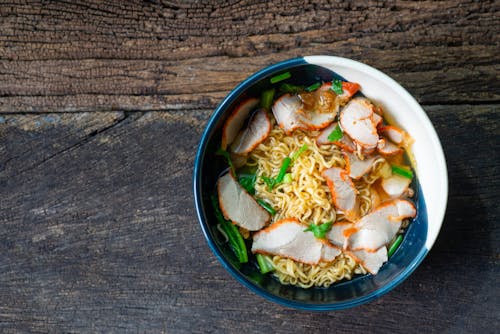 In this post, we'll look at a study exploring whether highly processed foods can lead to cancer and other serious medical conditions.
In this post, we'll look at a study exploring whether highly processed foods can lead to cancer and other serious medical conditions.
We’ll also look at what percentage of our daily food consumption is made up of highly processed foods and what that can mean for health. Finally, we’ll talk about easy ways to lower your consumption of highly processed foods, and why it’s important to do so.
British Medical Journal Study
A British Medical Journal study reports a possible association between consumption of highly processed or so-called "ultra-processed” food and cancer. Their study suggests a possible link between highly processed foods and caner.
Further exploration is needed, but these results suggest that the rapidly increasing consumption of ultra-processed foods, "may drive an increasing burden of cancer in the next decades," researchers warn.
What Are Ultra-Processed Foods?
Ultra-processed foods include packaged baked goods and snacks, fizzy drinks, sugary cereals, ready meals and reconstituted meat products—often containing high levels of sugar, fat, and salt, but lacking in vitamins and fibre. They are thought to account for up to 50% of total daily energy intake in developed countries.
A few studies have linked ultra-processed foods to higher risks of obesity, high blood pressure and cholesterol levels. But firm evidence linking intake to risk of disease is still scarce.
Study Design
To gain more clarity on the possible link, a team of researchers based in France and Brazil evaluated potential associations between ultra-processed food intake and risk of of increased cancer in general and breast, prostate, and bowel (colorectal) cancers in particular.
Their findings are based on nearly 105,000 healthy French adults. Twenty-two percent of those studied were men and 78% were women with a total study group average age of 43 years. Participants completed at least two 24-hour online dietary questionnaires designed to measure their usual intake of 3,300 different food items.
Foods were grouped according to degree of processing and cases of cancer were identified from participants' declarations validated by medical records and national databases over an average of five years.
Several well known risk factors for cancer, such as age, sex, educational level, family history of cancer, smoking status and physical activity levels, were taken into account.
Study Results
Study results showed a 10% increase in the proportion of ultra-processed foods in the diet of study participants was associated with an increase of 12% in the risk of overall cancer and 11% in the risk of breast cancer. No significant association was found for prostate or colorectal cancers.
Further testing found no significant association between less processed foods such as canned vegetables, cheeses and freshly made unpackaged bread, and risk of cancer.
The consumption of fresh or minimally processed foods such as fruits, vegetables,, rice, pasta, eggs, meat, fish and milk was associated with lower risks of overall cancer and breast cancer.
Ultra-Processed Foods in the U.S. Diet
In another study published on March 9, 2018 in the, “British Medical Journal Open”, researchers concluded ‘ultra-processed' foods make up more than half of all calories consumed in the US diet, and contribute nearly 90% of all added sugar intake.
This study points to salt, sugar, oils, fats, along with flavorings, emulsifiers, and other additives designed to mimic the qualities of 'real foods’ as being common ultra-processed foods. Soft drinks, packaged snacks, deserts, packaged baked goods, chicken and fish nuggets, and other reconstituted meat products are also typically ultra-processed food items.
Study researcher looked at dietary intake for more than 9,000 U.S. residents in the years 2009 and 2010. They were particularly interested in people who consumed more than 10% of total energy intake from added sugars. Ten percent is the maximum intake recommended for good dietary health. Nearly 60% of caloric intake was from ultra-processed foods that resulted in nearly 90% of energy intake from added sugars.
What Health Organizations Say
The World Health Organization, the American Heart Association and other professional health organizations warn that excess added sugar consumptions can result in weight gain, obesity, diabetes, tooth decay, and cardiovascular disease. Based on the scientific research, consuming ultra-processed food is bad news for health.
What can we do?
First, read labels. Know what you’re eating. If a processed food item is high in sugar - to include artificial sweeteners and high-fructose corn syrup - think twice before purchasing that item. Look for low or no processed food items instead.
Second, shop the outside perimeter of the grocery store. Typically, fresh produce and fruits are either on the right or left side of the store as you enter the front door. Most processed food items are in the middle aisles with colorful packaging and displays. Avoid these aisles and buy fresh produce, fruits, preferably organic or locally grown. If you eat meat, buy non-processed meat as lean as possible.
Third, shop your local farmers markets. When shopping farmers markets you usually can talk with the farmers who raise the food. Ask them how their food is grown, whether they use pesticides, and what sustainable farming methods they’re using. Buy local, buy fresh, and if possible, buy from farmers directly.
---
HOW TO SUBSCRIBE TO THE WEIGHT FOR WELLNESS PODCAST:
Sources for this show and post:
More information: Ultra-processed foods and added sugars in the US diet: evidence from a nationally representative cross-sectional study, BMJ Open, DOI: 10.1136/bmjopen-2015-009892
More information: Consumption of ultra-processed foods and cancer risk: results from NutriNet-Sante? prospective cohort, BMJ (2018). www.bmj.com/content/360/bmj.k322
 Should you weigh yourself daily? Weight Watchers and some other programs say, "No". In this podcast episode (player below), you'll learn what research tells us.
Should you weigh yourself daily? Weight Watchers and some other programs say, "No". In this podcast episode (player below), you'll learn what research tells us.






